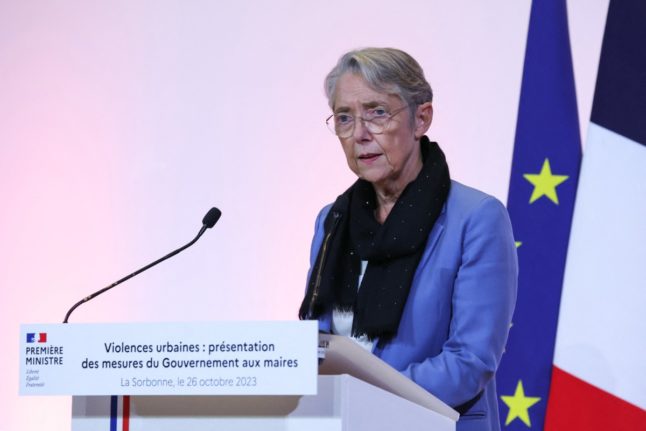In late June, France saw almost a week of nightly rioting in which buildings and cars were set ablaze, stores looted and young people engaged in running battles with the police.
The riots followed the death of a 17-year-old boy in a police traffic stop – and the emergence of a video that revealed that police officers had lied about what happened.
On Thursday PM Elisabeth Borne – speaking to an audience of local mayors – unveiled plans to tackle the violence including ‘military’ schools, tougher penalties for the parents of delinquent teenagers and a €100 million fund to repair the damage caused during the riots.
Because many of the June rioters were very young – three quarters of those arrested were under 25 and a fifth were still in school – the focus has fallen on parents and schools.
Borne announced the creation of “parenting courses” for parents whose children persistently cause trouble, as well as community service sentences for parents who have “failed in their educational duties”. Parents would also be financially liable for damage caused by their children.
“When a minor has caused damage, we must ensure that both parents are financially responsible for the damage caused, whether they are together or not, whether they live with the child or not,” she said.
In France, under 18s are very rarely jailed, but they can be sent to residential schools – Borne announced that she is considering changing the law to allow young people to be placed in residential schools run by “the judicial youth protection services”.
She also spoke of supervision by “military personnel” – although provided no concrete details.
Borne announced that Forces d’action républicaine (republican action forces) will be deployed in troubled areas – a combined team including police and magistrates but also social workers and healthcare staff that can work with troubled families to restore order and provide help where needed.
They will be deployed at the request of local authorities.
Her speech also announced
- In cases where a curfew is imposed by local authorities – as several areas did during the riots – the maximum penalty for breaking the curfew will be raised from €150 to €750.
- The time spent on civics education at collège (secondary school) level will be doubled, while schools can reopen in August for pupils who are having difficulties.
- Municipal police – a lower level of police who do not have powers of arrest – will be given extra powers
Borne also revealed that of the rioters arrested, three quarters were under the age of 25, and a fifth were still in school.
She added that three quarters of them were born in France, one third had not finished school and the children of single-parent families were “strongly represented”.
She said: “This indicated a worrying normalisation of violence and a more general breakdown of authority.”



 Please whitelist us to continue reading.
Please whitelist us to continue reading.
I don’t believe the military is trained or interested in rehabilitating delinquent youth – is that really the solution for disaffected youth? Entrusting these children to the military is a recipe for mistreatment and abuse. Sending delinquents to a school where they can receive the structure and attention to become good, productive citizens – whether a military school or otherwise – is a better solution.